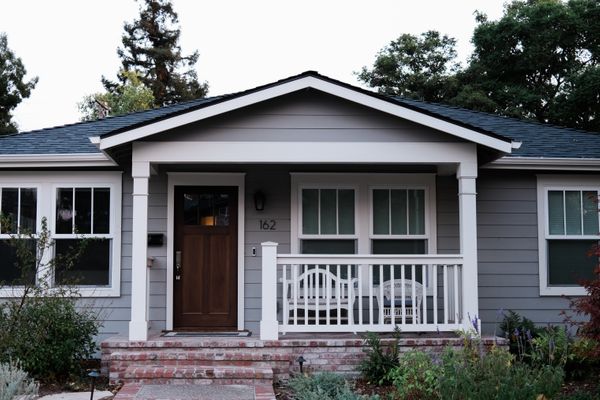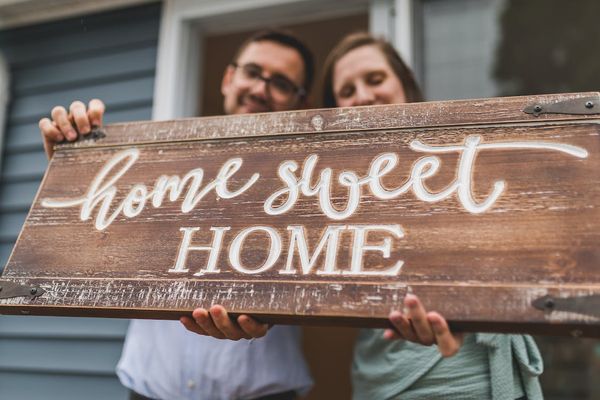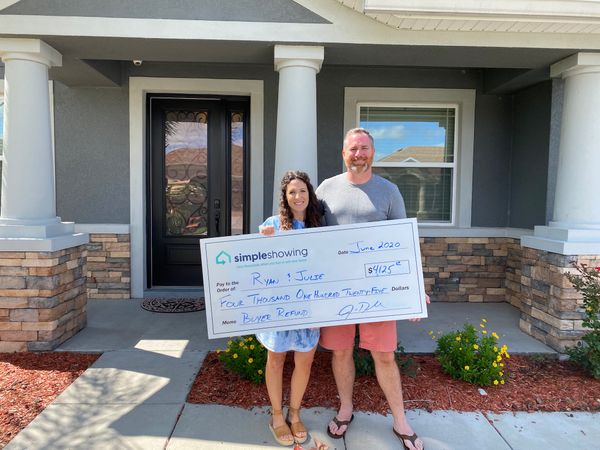Buying a house is a dream come true for many people, but the prospect of coming up with a down payment can seem daunting. However, it is possible to buy a house with little or no money down.
First it's important to understand the typical, out-of-pocket costs when you buy a house if you didn't have access to no-money down programs. Here's what you'd normally have to pay:
- Down payment: Typically 3-5% of the purchase price of the home
- Closing costs: Typically 1-3% of the purchase price of the home
Without leveraging down payment assistance programs, grants and a little creativity, most people need about 4-6% of the home price in cash (or savings) to buy a home. With an average home price in the US of $354,000 this means that you would ordinarily need a minimum of $14,160 to buy a house.
If you don't have $14K+ sitting in your bank account, you'll need to get creative and take advantage of government programs, lender credits and broker rebates. Below we explore some of the ways you can achieve the goal of homeownership with little or no out of pocket costs.
First-Time Home Buyer Grants and Programs
Navigating the path to homeownership can be challenging, especially for first-time buyers with limited funds. Fortunately, numerous grants and programs are available specifically to assist first-time home buyers. These initiatives, often funded by government agencies or private organizations, provide invaluable resources like financial grants, which don't require repayment, and educational programs to guide you through the buying process. Such support can significantly reduce the financial burden and demystify the complexities of purchasing your first home.
Requirements:
- Being a first-time homebuyer (not having owned a home in the previous three years)
- Meeting income limits specified by the program
- Purchasing a home within the program's price limits
- Occupying the home as the primary residence
- Completing a homebuyer education course, if required
- Meeting credit and employment criteria set by the program
Zero Down Payment Mortgages
Zero down payment mortgages offer the benefit of financing the entire purchase price of a home, eliminating the need for a down payment. This option is particularly beneficial for buyers who have a stable income but lack the funds for an upfront payment. While these mortgages increase accessibility to homeownership, they often come with higher interest rates and mandatory mortgage insurance, which can increase the monthly payments.
There are also some mortgage lenders that offer zero down payment mortgages in certain cities, specifically for Black/African American and Hispanic borrowers. For example, Bank of America offers a zero down program in Charlotte, Dallas, Detroit, Los Angeles and Miami. Their program is referred to as the "Community Affordable Loan Solution."
These loans often have stricter credit score requirements than other types of loans and may require you to pay for private mortgage insurance (PMI). However, they can be a good option for borrowers who don't have a lot of cash on hand for a down payment.
Requirements:
- Good credit history
- Stable income
- Higher interest rates and mortgage insurance may apply
- Specific lender requirements
USDA Loan 100% Financing
USDA loans, designed for rural and suburban homebuyers, offer 100% financing with no required down payment. Aimed at helping lower-income buyers, these loans have specific income limits and require the property to be located in an eligible rural area. They offer the advantage of lower interest rates and do not require private mortgage insurance, though there is a guarantee fee.
USDA loans are an excellent choice for eligible buyers looking for affordable homeownership without the burden of a large down payment. These loans do not require a downpayment and have more lenient credit score requirements than traditional loans. However, they are only available in designated areas.
Requirements:
- Property in eligible rural area
- Income limits apply
- U.S. citizenship or permanent residency
- Credit score requirements
Down Payment Assistance Programs
Down payment assistance programs are designed to help first-time and low-income buyers cover the costs of down payments and closing fees. These programs, often offered by government agencies, nonprofits, or private lenders, can come in various forms such as grants, low-interest loans, or forgivable loans. These programs can significantly reduce the initial financial burden of purchasing a home, making homeownership more accessible for a broader range of people.
There are also many down payment assistance programs available to help homebuyers who don't have enough cash on hand for a down payment. These programs can vary depending on where you live, but they often offer grants or loans that can be used to cover all or part of the down payment and closing costs.
Neighborhood Assistance Corp. Program (NACA): NACA provides 100% financing loans, which means no down payment requirement or closing costs. There's also no minimum credit score. NACA also helps by providing low-income families workshops, which you must attend in order to qualify for 100% financing.
Requirements:
- First-time homebuyer status often required
- Income limits
- Homebuyer education courses
- Property in specific areas
Real Estate Commission Refunds & Rebates
Real estate commission refunds and rebates involve agents returning a part of their commission to the buyer at closing. This practice can provide financial relief to buyers, helping them with closing costs or the down payment. The availability and legality of these rebates vary by state, and not all agents offer them. Buyers interested in this option should inquire with their agent and understand any potential tax implications.
An often overlooked option is a commission credit from your real estate agent. Typically your Realtor will earn a 2.5 - 3% commission when you purchase a home. For a $350,000 home, that could be a commission of $10,500.
According to the US Department of Justice, rebates and commission credits are encouraged for promoting innovation and competition in the real estate industry. Two companies that offer refunds are Redfin ($2,400 on average) and SimpleShowing ($4,700 on average).
Requirements:
- Working with an agent who offers refunds/rebates
- Legal in your state
- Agreement terms with the real estate agent
VA Loan 100% Financing
VA loans, available to eligible veterans, active-duty service members, and their spouses, offer 100% financing without the need for a down payment or private mortgage insurance. These loans are backed by the Department of Veterans Affairs and typically have competitive interest rates. VA loans are a valuable benefit of service, providing an affordable path to homeownership.
Eligibility requirements include service duration and discharge conditions, and there's a funding fee, which can be rolled into the loan amount. Additionally, VA loans often have lower interest rates than other types of loans and do not require private mortgage insurance (PMI).
Requirements:
- Service in military, reserves, or National Guard
- Satisfactory credit and income
- Certificate of Eligibility from VA
- For primary residence
Low Down Payment Mortgage Options
Conventional Loans
Conventional loans, not backed by a government entity, are a favored choice for those with stronger credit histories. These loans typically require a down payment, which can be as low as 3%, but having a higher down payment can lead to better interest rates and avoid private mortgage insurance (PMI).
They offer a wide range of flexibility in terms, from 10 to 30 years, and are available for various types of properties including single-family homes, multi-unit properties, and investment properties. Borrowers with higher credit scores and stable income find conventional loans advantageous due to their competitive interest rates and lower overall borrowing costs.
Requirements:
- Good to excellent credit
- Stable income and employment history
- Down payment (varies, often 3-20%)
- Debt-to-income ratio within guidelines
HomeReady Loans
The HomeReady loan program, initiated by Fannie Mae, is tailored for low to moderate-income borrowers. It allows for a down payment as low as 3% and offers flexible funding options, including gifts and grants. A significant feature of the HomeReady program is its inclusive approach to considering income; it recognizes non-traditional sources such as income from other household members and boarders.
The program also provides online education courses to prepare borrowers for homeownership responsibilities. Its reduced mortgage insurance premiums and potential for lower interest rates make it a compelling option for those who may struggle to meet traditional lending criteria.
Requirements:
- Low to moderate income
- At least one borrower is a first-time homebuyer
- Completion of an educational course
- Down payment as low as 3%
Home Possible Loans
Freddie Mac’s Home Possible Loans focus on serving low-income buyers, offering them a pathway to homeownership with as little as a 3% down payment. These loans are characterized by their flexibility in income sources and down payment assistance, allowing borrowers to use sweat equity to cover part of the down payment and closing costs.
Home Possible Loans are particularly beneficial for borrowers with limited cash reserves but steady income, including first-time homebuyers, retirees, and low- to moderate-income individuals. This program also includes special provisions for buyers in high-cost and underserved areas, making homeownership more accessible across diverse communities.
Requirements:
- Low income
- First-time homebuyers, retirees, and others
- Stable income
- Low down payment options
FHA Loans
FHA loans, insured by the Federal Housing Administration, are particularly suitable for first-time homebuyers and those with less-than-perfect credit. They require a down payment as low as 3.5% for credit scores of 580 and above, but borrowers with credit scores between 500-579 are still eligible with a 10% down payment.
FHA loans are known for their leniency in credit requirements and debt-to-income ratios, making them a viable option for buyers who might not qualify for conventional loans. However, borrowers must pay for mortgage insurance, which adds to the overall cost of the loan but protects the lender in case of default.
Requirements:
- Lower credit scores accepted (as low as 500)
- Higher debt-to-income ratio allowed
- Down payment as low as 3.5%
- Mortgage insurance required
Frequently Asked Questions (FAQs)
Q: What credit score do you need to have to buy a house?
A: A credit score of 620 is often considered the minimum for conventional loans. However, for FHA loans, you can qualify with a score as low as 500 (with a 10% down payment) or 580 (with a 3.5% down payment). Higher credit scores can secure better loan terms.
Q: How do I get money for a down payment?
A: Saving money, receiving gifts from family, utilizing down payment assistance programs, or using funds from retirement accounts (within specific rules) are common ways. Some opt for a second job or side business to save extra money.
Q: How do I know if a zero-down or low money down loan is right for me?
A: Consider your financial stability, monthly budget, and long-term plans. Zero-down loans may have higher monthly payments or require mortgage insurance. If you can afford these costs without financial strain, they can be a good option.
Q: What are my options if I don’t qualify for a low money down loan?
A: You might explore renting with an option to buy, seeking co-borrowers, improving your credit score, saving for a larger down payment, or exploring local and state housing programs.
Buying a Home with No Money: Conclusion & Final Tips
Understanding the nuances of home financing, from zero down payment mortgage options like USDA loans and conventional loans with minimum down payment requirements, is crucial in navigating the path to homeownership. Whether opting for a low down payment solution or a zero down mortgage, it's important to consider the implications on your monthly mortgage payment. While options like a no down payment mortgage can make initial homeownership more accessible, they often require mortgage insurance, affecting your monthly payment.
Before applying to one or more programs, make sure you have a solid credit score. While some loans may have more lenient credit score requirements than others, having a good credit score can help you secure the best possible interest rate and loan terms. In conclusion, buying a house with no money down is possible, but it requires research, preparation and creativity. Happy house hunting!






